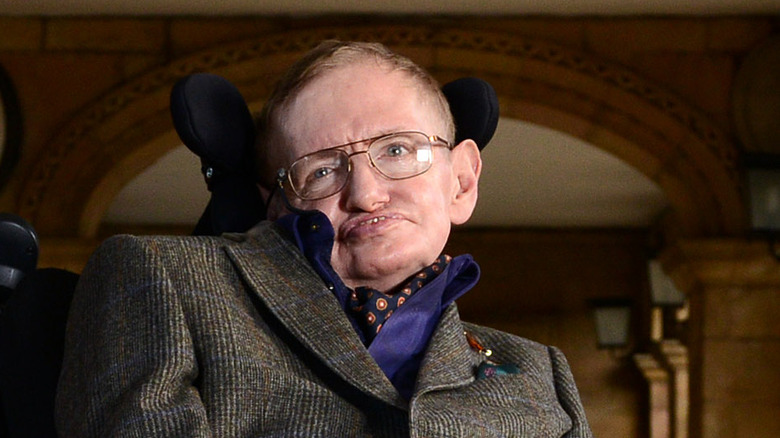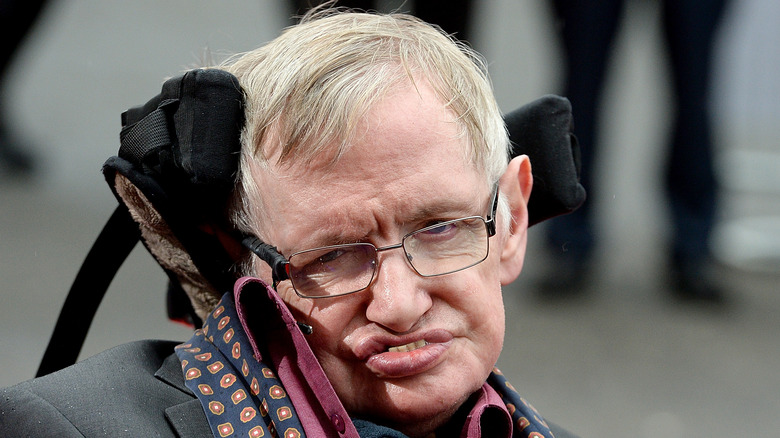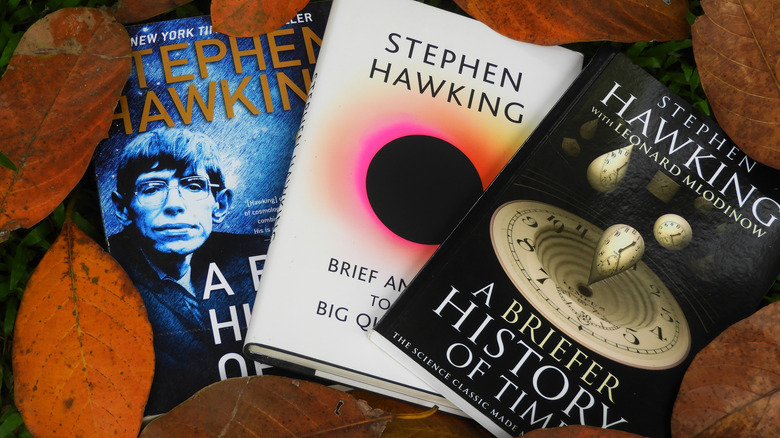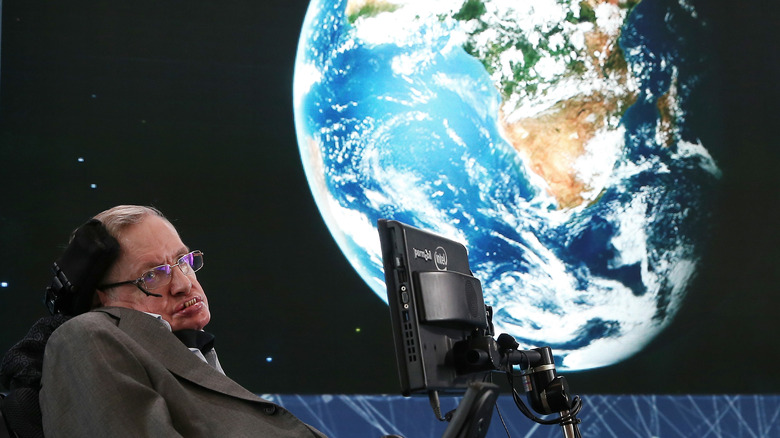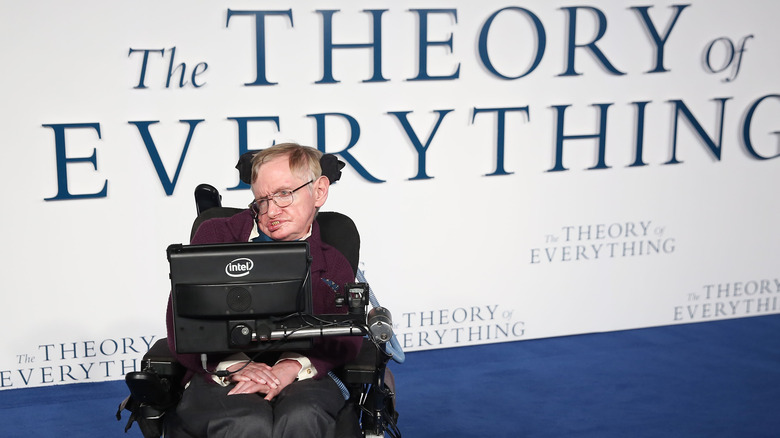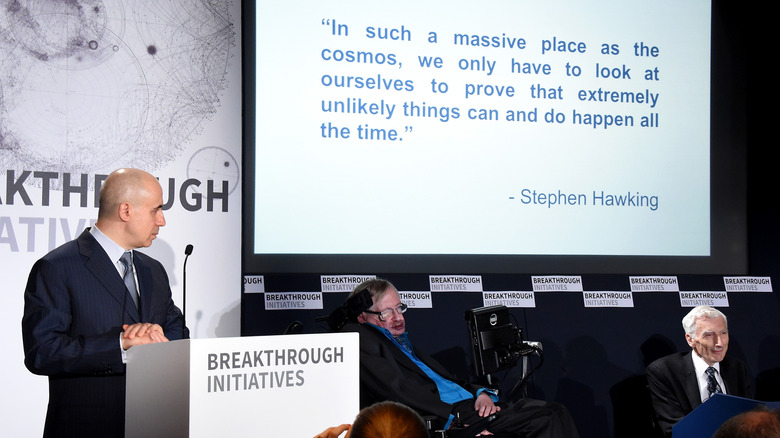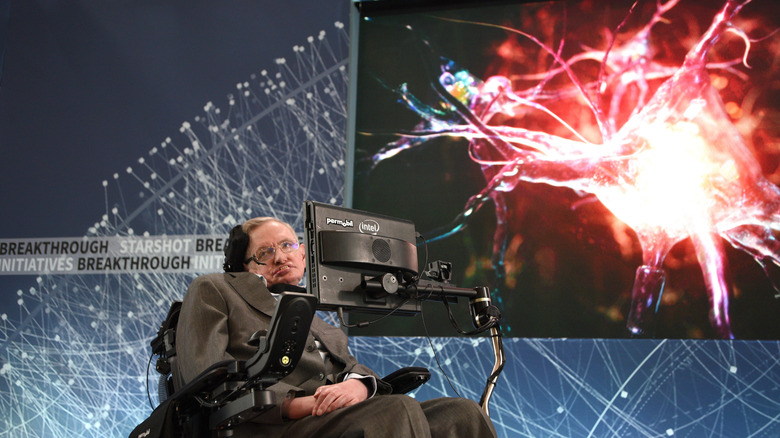This Is How Stephen Hawking Predicted The End Of The World
It's no secret that when Stephen Hawking died in 2018, the world lost one of the most brilliant minds ever to turn itself to solving some of science's most complicated problems. His obituary in The Guardian described his "almost supernatural gifts," along with his sense of humor and his ability to get non-scientists interested in what he had to say.
And he had a lot to say: Some of it was moving, some of it was funny, and some of it just went sailing over the heads of most people. But some of it concerns something that impacts everyone on the planet, and that's the end of the world. Hawking made some dire predictions not only about how the planet itself was going to end, but what was going to become of the universe, too. There's good news and bad news here, and that's basically that humankind was going to destroy itself long before the universe came to a screeching halt. So ... good job?
Before taking a look at just what he issued his predictions about, there's an important footnote here. He also noted (via the BBC) that with progress would come "new ways things can go wrong," but it wasn't all doom and gloom.
He explained, "We are not going to stop making progress, or reverse it, so we have to recognize the dangers and control them. I'm an optimist, and I believe we can."
Multiverses are real
Let's talk large-scale, because Stephen Hawking's last paper — published just before his death — was all about what was going to happen to the universe. It's called "A Smooth Exit from Eternal Inflation?" and no, it doesn't make any sense at all to the vast majority of people. But that's all right: Even the experts struggled with this one, so let's make sense of it with help from some of them.
University at Buffalo professor Will Kinney says it's based on the idea of eternal inflation, which is basically the uneven expansion of the universe (via Discover). That, in turn, creates pocket universes that exist with an ever-growing space between them. University of Southern California professor Clifford Johnson has a brilliant analogy: "It's like you have a bath full of lots and lots and lots of different kinds of soap bubbles, and each soap bubble is a different universe," as per Discovery.
Marvel fans will like this next bit: According to cosmologist Andrei Linde (via Gizmodo), that's essentially going to make the multiverse a real thing — so that's fun. "... anything that can happen will happen an infinite number of times," he says. And he explains that the paper has this to say about the end of it all: "They argue that the end of eternal inflation may occur in a smooth way, and the variety of the possible outcomes is limited."
Vague? Yes: Perhaps unsurprisingly so.
AI will replace humans
Anyone who has seen any of the "Terminator" films knows how this whole artificial intelligence thing is probably going to end, and here's a bit of terrifying validation: Stephen Hawking agreed. In 2017, he told Wired, "The genie is out of the bottle. ... I fear that AI may replace humans altogether. If people design computer viruses, someone will design AI that replicates itself. This will be a new form of life that will outperform humans."
Well, that's all right, then, we're safe for a good long ... time? Right? Not quite: It's already happened.
In November 2021, the Wyss Institute at Harvard announced that a collaboration between Wyss, Tufts, and the University of Vermont had created "the first-ever, self-replicating living robots." Called Xenobots, these tiny, hand-built organisms/robots (which look disturbingly like Pac-Man) can hone in on living cells, then gather together to collect stem cells to build new little baby robots inside these cells. The University of Vermont's Joshua Bongard confirms: "With the right design — they will spontaneously self-replicate."
They were created with all the best intentions, but everyone knows that saying about the road to hell, right? Will it apply? Who knows! Bongard says that the potential for the Xenobots to be deployed to do things like remove microplastics from the environment and attack cancer cells is there, and that's all pretty brilliant applications for a mind-blowing new technology. But, will it get out of hand? According to Hawking: Probably.
Climate change is pretty terrible
America's withdrawal from the Paris climate agreement was the thing that made scientists around the world throw their hands in the air and wonder what the heck they even went to college for, and Stephen Hawking had thoughts on it, too. He told the BBC, "We are close to the tipping point where global warming becomes irreversible. Trump's action could push the Earth over the brink, to become like Venus, with a temperature of two hundred and fifty degrees, and raining sulphuric acid."
That's a pretty dismal glimpse into the future, but hey, at least humankind would probably be wiped out before surviving to see it, so there's something to look forward to. Perhaps unsurprisingly, things haven't really been looking up.
In 2021, the BBC reported on the almost unthinkable results of a study from the Weizmann Institute, which found that on average, every week, each person produces human-made mass waste greater than their own body weight. Even more depressing, the man-made stuff on the planet had surpassed the weight of the naturally occurring stuff.
As the Los Angeles Times looked forward to 2022, they said that the best they were hoping for was "a string of little victories," in the face of a global pandemic, increasing greenhouse gases, record-setting wildfires and other natural disasters, and widespread misinformation amid it all.
An expanding population
There's nothing like a global pandemic to make everyone acutely aware of just how many people there are on this planet, but it was years before anyone ever heard of COVID that Stephen Hawking was warning that there were just too many people. He told Wired in 2017, "Our Earth is becoming too small for us, global population is increasing at an alarming rate, and we are in danger of self-destructing. ... we need to actively pursue an alternative way of living if the human race is to survive ..."
According to Nature, fast-forwarding to 2021 leaves scientists kind of scratching their heads. While researchers from the United Nations suggest there's going to be a whopping 11 billion people on the planet by the end of our century (compared to the some 8 billion there are in 2022), other estimates say that it's going to hover around a max of 9 billion. The Pew Research Center says falling fertility rates suggest that the population will essentially stop in its tracks.
While scientists like Hawking might say that's in the best interests of the planet, theirs aren't the only voices out there. In the beginning of 2022, Pope Francis made headlines for condemning couples who decided against having children, calling them "selfish." He said (via the BBC), "Sometimes they have one, and that's it, but they have dogs and cats that take the place of children. [This] is a denial of fatherhood and motherhood and diminishes us, takes away our humanity." The irony.
Genetically engineered super-humans
Just the idea of genetically engineered super-humans sounds a little far-fetched, but Stephen Hawking didn't think so. He even included a warning about it in his book, "Brief Answers to the Big Questions," which was published posthumously in 2018.
He wrote (via Newsweek), "I am sure that during this century people will discover how to modify both intelligence and instincts such as aggression." While he was equally certain that there would be legislation put in place to restrict what could be done, he continued that "... some people won't be able to resist the temptation to improve human characteristics, such as memory, resistance to disease and length of life."
Hawking saw the result of such genetic tinkering as a massive — and dangerous — division between genetically engineered people and regular old, non-engineered people. While he saw it happening before the end of the century, it's already happened.
In 2019, Nature did a piece on the "CRISPR-baby scandal," and it's exactly what Hawking warned of. Chinese biophysicist He Jiankui announced that he had genetically engineered twin girls, who would be born with a genetic immunity to HIV. The announcement predictably sent the scientific world into a tizzy, and it was a huge deal — He was sentenced to three years in prison, and his closest associates also got prison terms, says Nature. But is the metaphorical cat out of the bag?
Genetically engineered viruses
In 2016, Stephen Hawking gave the BBC's Reith Lectures, and in it, he name-checked "genetically engineered viruses" as one of the things he saw as being one of the serious contenders for ending the human race. Medical Daily agrees, quoting an article from the Journal of Toxicology and Environment Health that says these viruses "possess significant unpredictability and a number of inherent harmful potential hazards."
It's nice to think that no one's genetically engineering viruses with the goal of bringing about the end times, so why muck about with them?
There's lots of reasons. Researchers from Texas A&M wrote a 2016 piece for The Conversation on their work in engineering a virus that would interfere with the way the brain's neurons create pathways to addiction, particularly for things like alcohol and drugs. Admirable, right? News-Medical says there have been other pieces of research that have looked at the possibilities of engineering viruses that can target and fight cancer cells, boost a person's immune system, and treat a variety of diseases.
That all sounds great, but there's a catch. In 2020, Foreign Policy ran a terrifying piece on how easy it is to source the equipment needed by any home scientist who's just itching to do a little hack-and-slash gene editing on their own. It's available for online ordering, and they add, "One technology in particular makes it almost as easy to engineer life forms as it is to edit Microsoft Word documents."
A distrust in science
Stephen Hawking didn't live to see the COVID pandemic, but if he had seen it and the culture of science-denying anti-vaxxers that sprang up all over the world, he may have said something like, "I told you so."
When he spoke to Wired way back in 2017, the world was already on the anti-science warpath. Explaining that people didn't trust it because they didn't understand it, Hawking said, "It seems as if we are now living in a time in which science and scientists are in danger of being held in low, and decreasing, esteem. This could have serious consequences."
He had said something similar in 2015 (via The Guardian): "We have come to expect a steady increase in standard of living that science and technology have brought. But people distrust science, because they don't understand it ..." And that, he went on to say, was the key that was going to unlock the Pandora's Box of all the things that he believed had the ability to end the world, from genetic engineering to climate change. Without a basic understanding of scientific principles and a trust that scientists are right, bad decisions are bound to be made.
Hawking had a fix for this, too. In addition to embarking on scientific projects that wouldn't just change the world, but that would get the public — and particularly, the younger generation — involved, he said (via the BBC), "... everyone needs to have a basic understanding of science to make informed decisions about the future."
100 years
While it'd be nice to think that the people of Earth looked around and saw some pretty dire things happening in the world around them and decided to get their collective crap together, that's not exactly what Stephen Hawking saw happening. In fact, his predictions for the end of days got worse.
In 2016, he gave a lecture at Cambridge University, where he was pretty straightforward about what he believed, saying (via ScienceAlert), "I don't think we will survive another 1,000 years without escaping beyond our fragile planet."
The following year, Hawking halved that amount of time and set his doomsday date at the year 2600. He was speaking at the Tencent WE Summit when he said (via GeekWire), "By the year 2600, the world's population would be standing shoulder to shoulder, and the electricity consumption would make the Earth glow red-hot."
And then? That dropped to just 100 years. Vox says his revised timetable came after the United States pulled out of the Paris climate agreement, and he saw it as such a catastrophic move that he suggested humankind better get going on finding a new planet to live on, because we'd pretty much squeezed all the life out of this one. How's humankind doing on meeting that deadline? Space says that NASA is pitching missions to Mars that fly regularly starting in the 2030s, so while that might be enough to save some of humankind, it looks like the rest of it is going to be in for a bumpy ride.
